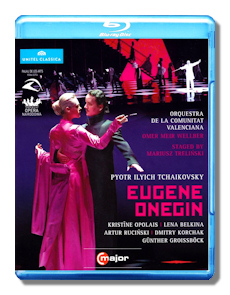
The Internet's Premier Classical Music Source
Related Links
- Tchaikovsky Reviews
- Latest Reviews
- More Reviews
-
By Composer
-
Collections
DVD & Blu-ray
Books
Concert Reviews
Articles/Interviews
Software
Audio
Search Amazon
Recommended Links
Site News
 Blu-ray Review
Blu-ray Review
Piotr Ilyitch Tchaikovsky

Eugene Onegin
- Kristine Opolais - Tatiana
- Artur Rucinski - Onegin
- Dmitri Korchak - Lensky
- Helene Schneiderman - Larina
- Lena Belkina - Olga
- Günther Groissböck - Gremin
- Margarita Nekrasova - Filipyevna
- Emilio Sanchez - Triquet
- Toni Navarrate - Guillot
- Aldo Heo - A Captain
- Simon Lim - Zaretsky
- Emil Wesolowski - O…
Cor De La Generalitat Valenciana
Orquestra De La Comunitat Valenciana/Omer Meir Wellber
Recorded live at the Palau de les Arts "Reina Sofia", Valencia Spain 2011
Unitel Classica/C Major BD4813 150m LPCM Stereo DTS-HD Master Audio
Also available on 2 DVDs 4813: Amazon - UK - Germany - Canada - France - Japan - ArkivMusic - CD Universe - JPC
This is a most unusual production of Tchaikovsky's Eugene Onegin. Why? You'll notice at the bottom of the cast list a name given as "O…" and, of course, such a character does not exist in Tchaikovsky's cast. So who is this character dressed in white, looking like death itself and roaming about the stage, often stalking or attending Tatiana? Well, that lone "O" in the cast list is a little too obvious: it is Onegin in ghostly form. But does he also represent fate? Is he not a foreshadowing of the withered love to come between Tatiana and Onegin? This is all very thought-provoking and interesting, and in general this production is quite gripping. But I don't think the production succeeds because of the insertion of this symbolic character into the story.
Kristine Opolais as Tatiana is brilliant, both in her vocal and dramatic contributions. Try the letter scene (track 11), where her singing is beautiful and filled with passion. She also has to deal with O here who both hounds her and comforts her. True, she seems to have a slightly cold demeanor not only in this scene but throughout the opera, but she incorporates it so well into the persona of Tatiana that it becomes natural and convincing. Helene Schneiderman as Larina and Artur Rucinski as Onegin are also excellent. Then there is Dmitry Korchak who is splendid as Lensky: try his brilliantly sung aria Kuda, Kuda (track 22). Actually, the singing from all the cast members is well above adequate.
What adds in a subtle way to this production are the sets of Boris Kudlicka: the stark background of birch trees in the first act provides an effective sort of haunting and gloomy atmosphere. In the succeeding acts there is a similar sort of barrenness: the dueling scene (track 23), for instance, with snow falling against a dark forest background, is very effective. The brighter atmosphere of the party at Madame Larina's house (tracks 17, 18 and 19) owes more to the lighting of reds and purples than to the sets. There is a walkway that surrounds the orchestra that is used at several points in the opera. The Act III ballroom scene features a long stairway with robotic dancers descending, then moving across what appears to be a huge chessboard to finally reach and traverse the walkway. There is a huge downward-pointing red arrow running parallel to the stairway. You'll remember that Tchaikovsky believed that productions of this opera should be relatively simple. In a sense Kudlicka and stage director Mariusz Trelinski follow that directive, while at the same time violating it by suggesting so much that is complex through various symbols, visuals and the character O. The costuming of Joanna Klimas seems appropriate for early 19th century styles, matching well the time frame of the story. That said, the use of a Victrola in Act I (track 8) by Lensky would place the action in the early 20th century.
The ballet scenes are adequately danced but the choreography by Emil Wesolowski (who portrays O) is not particularly imaginative. Israeli-born Omer Meir Wellber, music director at Valencia's Palau de les Arts "Reina Sofia", draws fine playing from the orchestra and delivers a very convincing interpretation of the score. The camera work and sound reproduction are excellent throughout. By the way, I should mention this is a production of the Polish National Opera but performed, of course, in Valencia with the orchestra and chorus from the opera house there.
In 2012 I reviewed an Opus Arte release of Eugene Onegin (Opus Arte Blu-ray OABD7100D) led by Mariss Jansons and found it generally good, while noting its inventive but screwy treatment by the stage director. This new production on Unitel Classica/C Major is not quite traditional but not nearly as radical or controversial as that earlier one. Both performances from a musical perspective are strong, but I think the singing of Kristine Opolais and the more convincing production features tilt the scales in favor of the newer effort.
Copyright © 2013, Robert Cummings





















